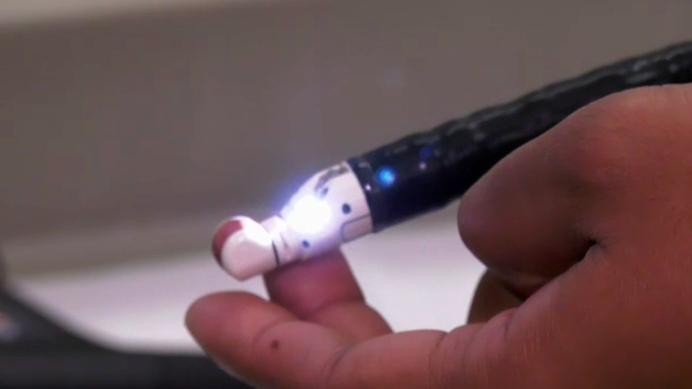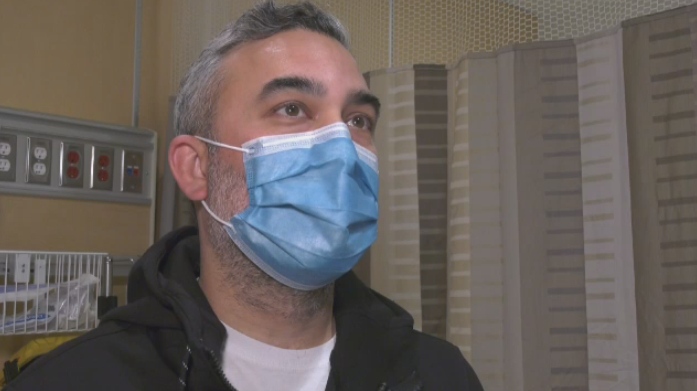How a first-in-region piece of equipment is changing patient care at Cambridge Memorial
It’s a medical first in Waterloo region and Wellington County.
A new endoscopic ultrasound at Cambridge Memorial Hospital will allow an estimated 450 patients a year to receive specialized diagnostic care without travelling outside the region – and for at least one of them, it’s already making a world of difference.
On Tuesday, the equipment was welcomed with a ribbon cutting and applause.
“It’s been over a decade of trying to get this for our patients,” gastroenterologist Dr. Dan Kottachchi said. “In terms of incorporating this into our practice, it’s been amazing.”
The machine has been at the hospital for six weeks now.
Used for the diagnosis of gastrointestinal diseases, it allows for biopsies to avoid referring patients to surgery, and its unique combination of technologies and diagnostic arm, is able to image hard to reach areas like the pancreas.
 The endoscopic ultrasound's arm. (Ricardo Veneza/CTV News)
The endoscopic ultrasound's arm. (Ricardo Veneza/CTV News)
“We can visually see what we're doing. For example, if we're biopsying a mass or a lymph node or a tissue outside the cavity of the stomach or colon, we can see that happening through the ultrasound image,” Kottachchi said.
Cambridge Memorial Hospital Chief of Medicine Dr. Augustin Nguyen has been pushing to bring the equipment to the hospital for more than 14 years. Nguyen says it will make diagnostic procedures less invasive and more accessible.
“Now we can get it [results] within a few days, it reduces their length of stay, gets a quicker diagnosis, gets quicker therapeutics and reduces the need for hospitalizations,” Nguyen explained.
 Brendon Mendonca was diagnosed with colon cancer last week. (Ricardo Veneza/CTV Kitchener)
Brendon Mendonca was diagnosed with colon cancer last week. (Ricardo Veneza/CTV Kitchener)
GAME-CHANGING FOR PATIENTS
For patients like Guelph’s Brendon Mendonca, it’s life-saving technology.
Mendonca says his response was “shock and just disbelief” when he was diagnosed with colon cancer last week, but having access to the diagnostic test so quickly has provided some relief.
“I found out about my diagnosis last Monday, and eight days later, I'm getting one of the more important tests conducted,” he said.
“It was hard enough to just wait a day, and a day, and a day, let alone to know it [the test] is so far down the road, and I don't know what I should be doing.”
Dr. Kottachchi says he was expecting a patient volume of four to five a week, but in the short time the equipment has been in operation, he’s already seen 10 to 12 per week.
Before its arrival, patients requiring this level of care were referred out-of-region to places like London, Oakville or Mississauga, which can add undue stress at an already stressful time.
The equipment cost hundreds of thousands of dollars and was funded by community donations.
“I just want to thank all the people that were involved because to the people that need it, it's huge,” Mendonca said. “You know, a week and a half ago, I wasn't in this situation and wouldn't have been thinking about this type of thing, but now that it's something I need, just, you never meet the people that helped to get it in place, but I just want to thank everybody involved.”
CTVNews.ca Top Stories

Trudeau's 2024: Did the PM become less popular this year?
Justin Trudeau’s numbers have been relatively steady this calendar year, but they've also been at their worst, according to tracking data from CTV News pollster Nik Nanos.
Manhunt underway after woman, 23, allegedly kidnapped, found alive in river
A woman in her 20s who was possibly abducted by her ex is in hospital after the car she was in plunged into the Richelieu River.
Death toll in attack on Christmas market in Germany rises to 5 and more than 200 injured
Germans on Saturday mourned both the victims and their shaken sense of security after a Saudi doctor intentionally drove into a Christmas market teeming with holiday shoppers, killing at least five people, including a small child, and wounding at least 200 others.
Overheated immigration system needed 'discipline' infusion: minister
An 'overheated' immigration system that admitted record numbers of newcomers to the country has harmed Canada's decades-old consensus on the benefits of immigration, Immigration Minister Marc Miller said, as he reflected on the changes in his department in a year-end interview.
Wild boar hybrid identified near Fort Macleod, Alta.
Acting on information, an investigation by the Municipal District of Willow Creek's Agricultural Services Board (ASB) found a small population of wild boar hybrids being farmed near Fort Macleod.
Summer McIntosh makes guest appearance in 'The Nutcracker'
Summer McIntosh made a splash during her guest appearance in The National Ballet of Canada’s production of 'The Nutcracker.'
The winter solstice is here, the Northern Hemisphere's darkest day
The winter solstice is Saturday, bringing the shortest day and longest night of the year to the Northern Hemisphere — ideal conditions for holiday lights and warm blankets.
Back on air: John Vennavally-Rao on reclaiming his career while living with cancer
'In February, there was a time when I thought my career as a TV reporter was over,' CTV News reporter and anchor John Vennavally-Rao writes.
It's eggnog season. The boozy beverage dates back to medieval England but remains a holiday hit
At Scoma's Restaurant in San Francisco, this holiday season 's batch of eggnog began 11 months ago.

































